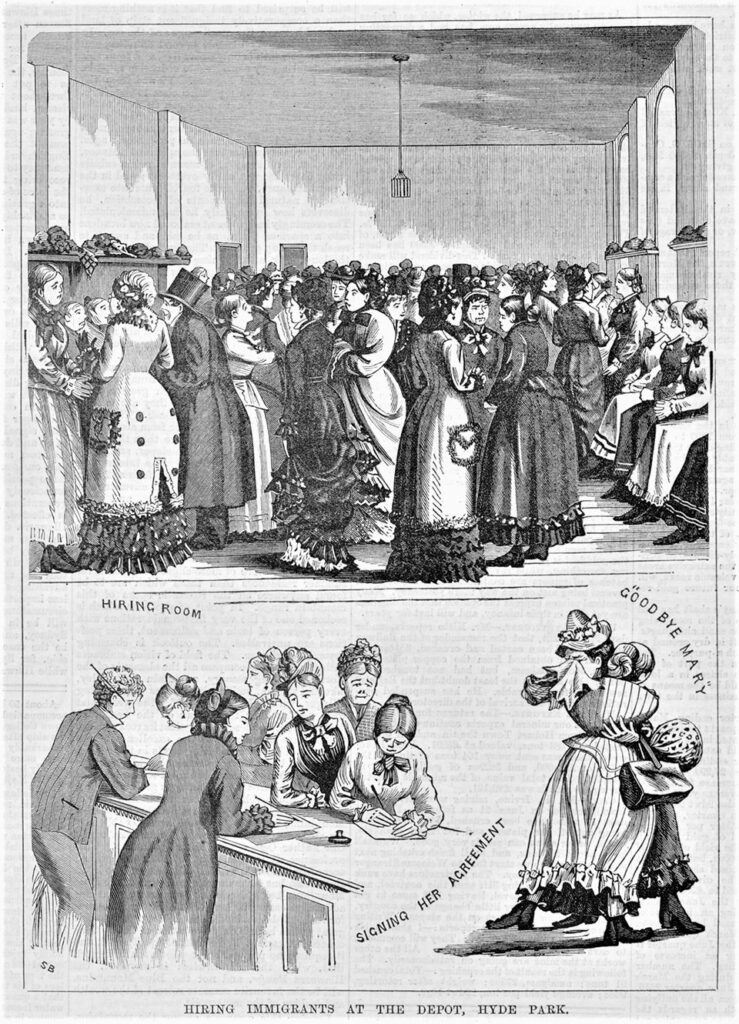The Orphans’ next Steps & Employment
By Averil Staunton
On arrival in Sydney, Australia the emigrant ships were boarded by the Immigration Agent and Medical Officer who recorded the particulars of each immigrant (from the Shipping Lists, or Immigration Board Lists) and checked their health status. This may have taken a couple of days with the private passengers disembarking first.
Following this, the girls with great relief, took their first steps on dry land and walked up the hill for a few hundred yards to the Female Immigrant Depot at Hyde Park. No doubt perhaps on unsteady feet after 100 days at sea and bamboozled with the new sights and sounds of the bustling harbours. Even the trees looked different, not to mind the odd sounding birds. They would have been wearing their new lighter clothes and bonnets and received many a whistle of approval from onlookers. They must have wondered what the next experience might be.
Two by two they walked towards a new life. These young Earl Grey orphan girls has encountered the worst and the best of experiences of their young lives. They had survived famine heartbreak, dreadful living conditions, trauma and loss and the dirt and disease of an overcrowded workhouse. They were remarkable tenacious girls. What brave hearts they had!
The young emigrants were kept at the British Army’s Hyde Park Barracks until they were hired for work. This barracks had formerly been a prison for Irish and English convicts sentenced to serve out their prison sentences in Australia. Scrutinised by immigration clerks, health officers and clergy, they shared sleeping quarters in the newly-appointed wards upstairs in the barracks. On the lower floor where the hiring rooms were situated they would have been inspect by prospective employers, before signing indentures for work.
Indentures were agreed with wages on a sliding scale according to age (this is why some orphans had exaggerated their age before the voyage!).
14 year olds received £7 per annum
Age 15 – £8 p.a.
Age 16 – £9 p.a.
Age 17 upward – £10 per annum
The indentured servitude system allowed employers to provide bed, board and shelter for indentured servants, as opposed to a living wage, hence the small stipend they received. This was considerably less than domestic staff, who were free of indenture.
However, compared to the workhouse where no money was paid for word carried out, this gave them an opportunity to feel free and motivated to complete their initial contract.
Indentured servants ultimately attained their freedom, once they completed their contract or become permanent employment, at the standard wage if both parties agreed.
Citizens of Australia
Many of the young orphan girls became the brides of merchants, farmers and gold-miners and had large families. A few had tragic lives and died young in the harsh surroundings of pioneer farms.
Today, their memory is held in high regard by their many Australian descendants. Here in Ballinrobe we want to honour our 26 young Orphans, their bravery and acknowledge their descendants as part of our Irish Diaspora.

‘Hiring immigrants at the depot, Hyde Park’, Australian Town and Country Journal, 19 July 1879. State Library of NSW